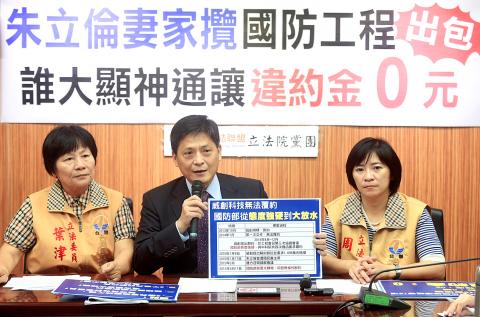Chinese Nationalist Party (KMT) Chairman and presidential candidate Eric Chu (朱立倫) might have pulled some strings to bring about an out-of-court settlement between the Ministry of National Defense and Vtron Technology, the Taiwan Solidarity Union (TSU) caucus said yesterday.
TSU caucus convener Lai Chen-chang (賴振昌) told a press conference that Vtron owner Kao Yu-jen (高育仁), Chu’s father-in-law, won a ministry contract in 2013 to manufacture key components for the Tien Chien II (TC-2), a medium-range air-to-air missile, by tendering a bid that was 35 percent below the minimum and failed to deliver.
Vtron’s successful bid generated doubts in the arms manufacturing industry from the outset and Vtron did not disappoint, drawing a complete blank in terms of development, Lai said, adding it was very suspicious that the ministry had a sudden change of heart and did not pursue legal action against Vtron.

Photo: Chien Jung-fong, Taipei Times
The project called for the production of 19 types of TC-2 missile components. With the minimum bid set at NT$238 million (US$7.28 million), Vtron won the bid by offering NT$150 million, with a promise to turn in the components 300 days after the signing of the contract.
The ministry and the Chung Shan Institute of Science and Technology have repeatedly demanded that Vtron produce the components, with the fourth such demand going out last year, Lai said.
The ministry had claimed it would not let Vtron off lightly because of its political connections, Lai said, referring to Kao and Chu.
However, the ministry did not press charges against Vtron, while the company took the ministry to court to effectively annul its contractual obligations, as well as ask for NT$1.92 million for material expenditures and NT$15 million for estimated benefits, the TSU said.
Lai said it was incredible that Vtron was able to win the project with its below-the-minimum bid and escape unscathed after failing to fulfill its contract.
The ministry’s abrupt U-turn in June, when it absolved Vtron of all responsibility, was highly suspicious and hints of behind-the-scenes political manipulation, Lai said.
Chu must offer an explanation for the turn of events, as Vtron might have robbed the government of NT$30 million in contract violation fees, he said.
Chu dismissed the allegations as nothing more than slander and rumormongering.
“It is inevitable that election mudslinging would eventually include me, but the public will only look down on [political parties] that employ smear tactics against my family,” Chu said.
Ministry spokesman Major General David Lo (羅紹和) said that the ministry strictly follows government regulations on procurement and subcontracting, and does not give special consideration to any company regardless of their background.
Additional reporting by CNA

Chinese Nationalist Party (KMT) Chairman Eric Chu (朱立倫), spokeswoman Yang Chih-yu (楊智伃) and Legislator Hsieh Lung-chieh (謝龍介) would be summoned by police for questioning for leading an illegal assembly on Thursday evening last week, Minister of the Interior Liu Shyh-fang (劉世芳) said today. The three KMT officials led an assembly outside the Taipei City Prosecutors’ Office, a restricted area where public assembly is not allowed, protesting the questioning of several KMT staff and searches of KMT headquarters and offices in a recall petition forgery case. Chu, Yang and Hsieh are all suspected of contravening the Assembly and Parade Act (集會遊行法) by holding

PRAISE: Japanese visitor Takashi Kubota said the Taiwanese temple architecture images showcased in the AI Art Gallery were the most impressive displays he saw Taiwan does not have an official pavilion at the World Expo in Osaka, Japan, because of its diplomatic predicament, but the government-backed Tech World pavilion is drawing interest with its unique recreations of works by Taiwanese artists. The pavilion features an artificial intelligence (AI)-based art gallery showcasing works of famous Taiwanese artists from the Japanese colonial period using innovative technologies. Among its main simulated displays are Eastern gouache paintings by Chen Chin (陳進), Lin Yu-shan (林玉山) and Kuo Hsueh-hu (郭雪湖), who were the three young Taiwanese painters selected for the East Asian Painting exhibition in 1927. Gouache is a water-based

Taiwan would welcome the return of Honduras as a diplomatic ally if its next president decides to make such a move, Minister of Foreign Affairs Lin Chia-lung (林佳龍) said yesterday. “Of course, we would welcome Honduras if they want to restore diplomatic ties with Taiwan after their elections,” Lin said at a meeting of the legislature’s Foreign Affairs and National Defense Committee, when asked to comment on statements made by two of the three Honduran presidential candidates during the presidential campaign in the Central American country. Taiwan is paying close attention to the region as a whole in the wake of a

OFF-TARGET: More than 30,000 participants were expected to take part in the Games next month, but only 6,550 foreign and 19,400 Taiwanese athletes have registered Taipei city councilors yesterday blasted the organizers of next month’s World Masters Games over sudden timetable and venue changes, which they said have caused thousands of participants to back out of the international sporting event, among other organizational issues. They also cited visa delays and political interference by China as reasons many foreign athletes are requesting refunds for the event, to be held from May 17 to 30. Jointly organized by the Taipei and New Taipei City governments, the games have been rocked by numerous controversies since preparations began in 2020. Taipei City Councilor Lin Yen-feng (林延鳳) said yesterday that new measures by